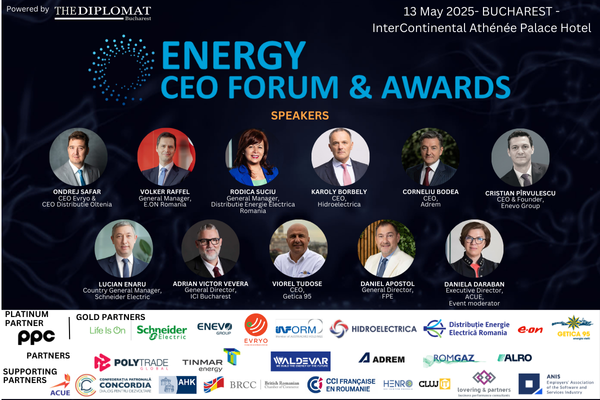Plastic waste thrown into nature – in forests, waters or on the side of the road – is considered one of the major environmental problems in the country by almost 1 in 7 Romanians. In fact, 60 percent of respondents say that there is far too much waste in nature in Romania and the same percentage claim that financial or legal sanctions are the best measure against littering, according to the data of a study carried out by WWF-Romania (World Wide Fund for Nature), the world’s largest environmental conservation organization.
Without action, plastic pollution is an economic burden, with costs estimated at USD 20 trillion globally, according to a WWF report, with packaging accounting for 40 percent of all waste.
According to international estimates, by the end of 2024, 770 million tons of plastic waste will be produced worldwide, of which almost 10 percent (70 million tons) end up in nature, being beyond normal waste management capacity.
The WWF-Romania survey highlights that the presence of plastic waste in nature is one of the biggest environmental problems in the country, along with deforestation, water pollution, air pollution, land desertification and rising temperatures. Thus, Romanians are willing to be actively involved in protecting nature by collecting waste, encouraged by actions such as the “Zero Plastic Patrol” project, implemented annually by the organization WWF-Romania, and 46 percent say that it would motivate them to act against the problems of environment if the area they live in is at risk.
“Plastic pollution has become an endemic problem in Romania. In Brașov and the Danube Delta alone, we collected thousands of kilograms of waste annually through the Zero Plastic Patrol program and, although the degree of awareness and education is increasing among Romanians, plastic waste is constantly present in the natural environment, affecting ecosystems, causing serious damage to repair in the long term. Moreover, our study shows that 56 percent of Romanians believe that there is far too much waste in nature and that more and more of them are more and more aware of the devastating impact of plastic pollution on the environment and, in particular, on their communities. Through dedicated programs to reduce pollution, our organization constantly fights for the preservation of nature, from the mountains to the rivers and the Danube Delta, which is a treasure of Romania. In parallel with the intensification of our education and awareness programs, as well as the stimulation of recycling initiatives, urgent measures are needed at the national level and we therefore call on the authorities, companies and citizens to work together to find viable solutions in the fight against plastic pollution. It is vital to act quickly to prevent the irreversible degradation of nature, through a change in behavior and an active involvement”, says Monia Martini, Green Economy Projects Manager within WWF-Romania and coordinator of the “Zero Plastic Patrol” program, one of the greater waste collection and education actions regarding plastic pollution in Brașov and the Danube Delta.
Those responsible for collecting plastic waste: what Romanians think
When asked who currently collects plastic waste from nature, 62 percent of Romanians say that NGOs concerned with the environment do the most, followed by citizens and garbage collection companies, respectively the city hall for 26 percent of respondents. When asked who should be responsible, the study shows that most Romanians, 72 percent of them, believe that they themselves are responsible for collecting garbage from nature. The following places are, in their opinion, garbage collection companies (64 percent of them), the town hall (61 percent) and other people (53 percent).
What measures should be taken and why would the Romanians get involved
Romanians claim that a series of measures are needed to protect nature, most, almost 40 percent, considering that imposing financial and legal sanctions on all those who cause environmental problems is the best method for limiting littering.
Also, 18 percent believe that changing the education system is the most effective measure, and 14 percent believe that a good alternative is changing public policies. Instead, 10 percent of them believe that carrying out environmental awareness campaigns is the optimal solution.
Also, when asked what would motivate them to take action against environmental issues, 47 percent cited natural disasters as the main reason. Also, 46 percent of Romanians would be more involved in protecting the environment if the area where they live was in danger, and 41 percent if there was an ecological crisis.
Plastic pollution is a significant problem, threatening wildlife, ecosystems and human health. Single-use plastics such as plastic bags, straws and bottles are a major contributor to this problem. These items are designed to be used once and then thrown away, but they take centuries to decompose and often end up in landfills, oceans and other natural habitats.
In order to reduce the amount of waste in the natural environment, WWF-Romania annually runs the “Zero Plastic Patrol” program in the Danube Delta and in Brașov, in which students, teachers and other people participate in greening in the respective regions. The project also involves the monitoring of biodiversity in the two areas, as well as actions to educate local communities.
Running since 2020, the “Zero Plastic Patrol” program includes information and education activities addressed to young people, tourists and members of local communities, advocacy activities addressed to local authorities and those responsible for waste collection, as well as greening activities through the presence of Patrol volunteers in the field, in the Danube Delta and Brașov.




